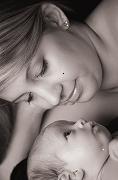There are many benefits for both parents and babies as outlined by the International Association of Infant Massage (IAIM) and summarized below:
Main benefits of baby massage
- Stimulation: of the body’s different systems, including the musculoskeletal, digestive, circulatory, nervous, immune and hormonal systems. Massage also stimulates brain development and body awareness. One-on-one time with your baby promotes two-way communication which is important for the attachment and bonding process.
- Relief: from discomfort and pain caused by wind, gas, colic and constipation; sinus congestion; teething; growing pains; and muscle tension. Premature and babies with special needs are at risk of sensitivity to touch which can be gradually relieved with nurturing touch and regular massage.
- Relaxation: Regular massage has been demonstrated to increase a baby’s ability to sleep deeply and reduce their stress hormones due to the release of oxytocin (the love hormone also released during breast feeding). Massage helps to regulate behavioural states so babies can stay calmer for longer, and encourage relaxation, whilst increasing the baby’s ability to process touch, reducing hyper-activity and hyper-sensitivity, which allows them to relax more easily.
- Interaction: by massaging your baby on a regular basis you learn to read their non-verbal communication cues. Baby massage is an intimate time encouraging one-to-one time with your baby and providing nurturing and loving touch, whilst encouraging eye contact and two-way communication. The outcome is that you learn to respect and understand your baby, and that your baby learns to trust you and adore your loving hands. This assists the bonding and attachment process that is essential for any parent (mother or father) and their baby.
Postnatal Depression
Typically women suffering from postnatal depression (PND) have problems relating to their baby. They can appear indifferent and communicate less with their baby compared to mothers without PND. Babies of mothers with PND may behave distressed with excessive crying or alternatively by becoming withdrawn.
Baby massage has been shown to significantly improve mother-baby interactions of mothers with PND. It is suggested this is due to the release of the love hormone oxytocin that is released during massage in both the mother and baby, which promotes the bonding and attachment process. In turn, this breaks the cycle of detachment and withdrawal by mother and baby that can last up to 18 months in some cases.
Ref: Glover, K et al (2002), ‘Benefits of infant massage for mothers with postnatal depression’. Semin Neonatol 7: 495-500.

